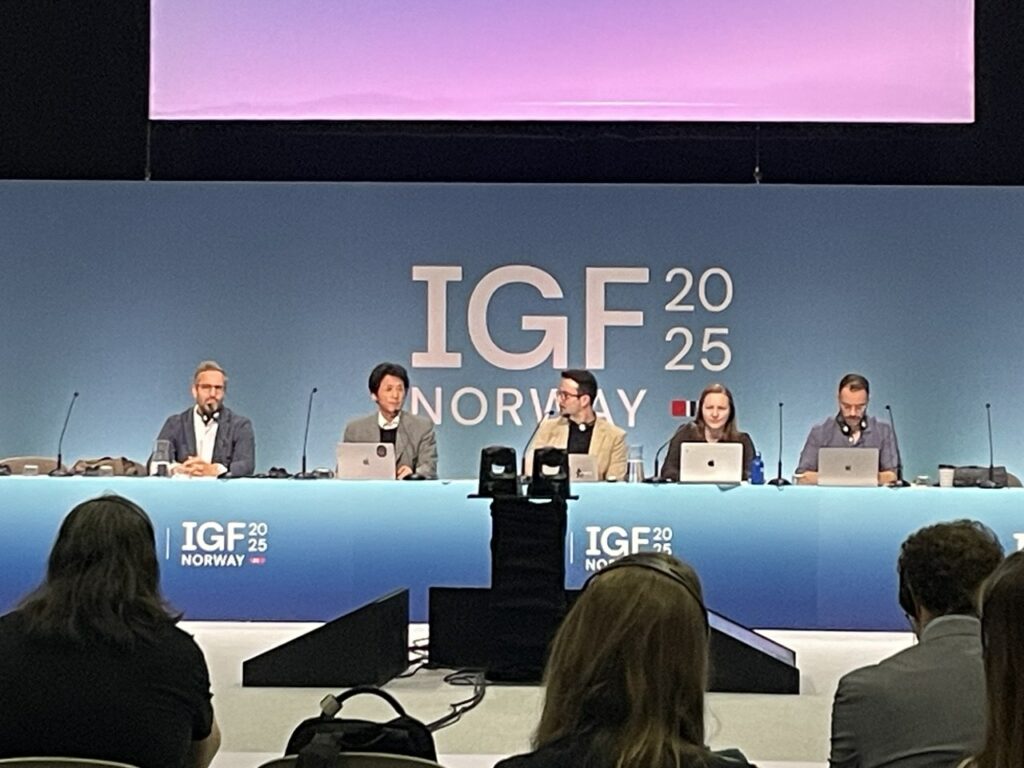
K.S. Park spoke at IGF Session WS #335 Global Perspectives on “Network Fees” and Net Neutrality on June 26 at 10 am as follows:
You already know that the sender pay rule proposed by telcos at ITU 2012 was roundly rejected by all stakeholders. The information revolution was made possible by the keep & bill system through which no one was charged for sending data (or even receiving data) because people crowdsourced their connections for mutual benefit – just like all the villagers come out to deliver water buckets free of charge to anyone to put out a house fire since the fire can happen any one house. And the data delivery to their immediate neighbors (or routers) did not cost much money.

As a result, people could speak online without having to worry about the financial cost of sending data to others. Of course, it had the added benefit of avoiding the political cost as you can see in contrast to the 1980s’ democracy fighters of Kwangju (in the photo) who are manually making leaflets that they had to distribute risking their lives. The new system was so efficient that it was made into law in the US and EU under the name of net neutrality and the internet was nominated for a Nobel peace prize. Now, the sender pay rule exactly undercuts by taxing people for speaking online.

Now, network fee proposal tries to sound different, and seems to apply only to cross-border data traffic and therefore has a nationalistic character to it. What telcos are saying is that they are spending money to maintain the domestic network so whoever is sending data into the network and therefore burdening the domestic network needs to pay the telcos maintaining it. However, what telcos are forgetting is that the traffic route has the overseas segment and the domestic segment.
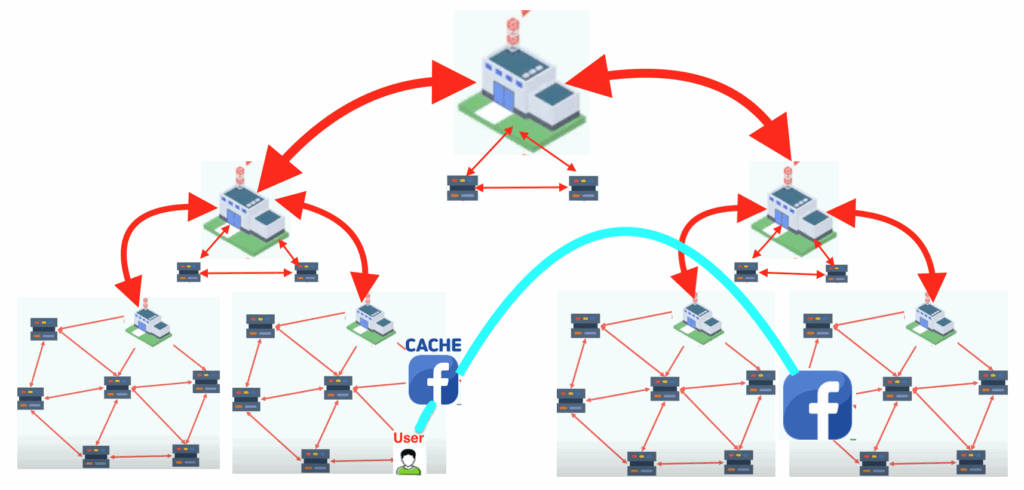
Who is paying for the overseas segment (the long blue line in the photo above)? Big techs are paying for that by investing in subsea cables or content delivery networks (top photo, blue line directly connecting Facebook main server in US and cache server in Korea) Telcos can charge their customers the monthly fees exactly because the customers can receive data from overseas big techs delivered through the subsea cables and CDNs. So telcos are benefitting the big techs’ overseas infrastructure just as much as big techs are benefitting from the domestic infra. It is a mutually beneficial relationship. Actually, it is the early internet framers’ decision not to charge one another in this mutual beneficial relationship that made the information revolution possible.
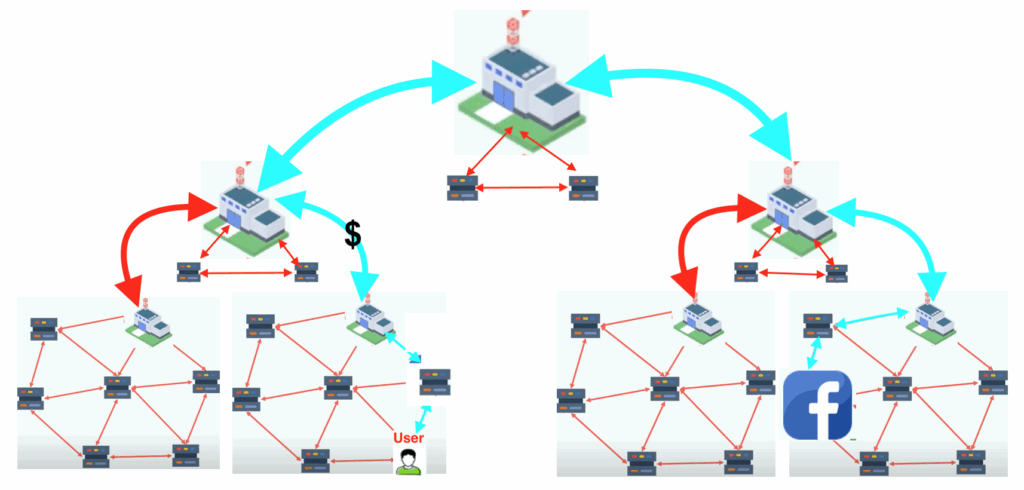
Actually, telcos already know this. That is why telcos, when they received the traffic through the higher tier providers before big techs began directly delivered their traffic at their doorstep (the blue lines in the photo above), actually paid money in doing so. By receiving traffic directly from big techs (the previous photo), they are actually saving that money. There is no justification to charge the big techs when the domestic telcos are benefitting from big techs’ investment in the overseas segment of the internet traffic.
Now, net neutrality allows paid peering of course but the problem with the network fee law is that it is mandating paid peering. Think about it. If the law requires one party to pay and the other party to get paid, what do you think will happen in that relationship? It will be abused by the party entitled to payment because no matter how much they ask, the other side must succumb to it because they have legal obligation to pay?
You don’t need a thought experiment for this. The real experiment was already done in South Korea. You will see that even a small departure from the mutual beneficial keep & bill principle causes a huge problem for the internet. In South Korea 2016, the government instituted a partial sender pay rule only among the telcos.
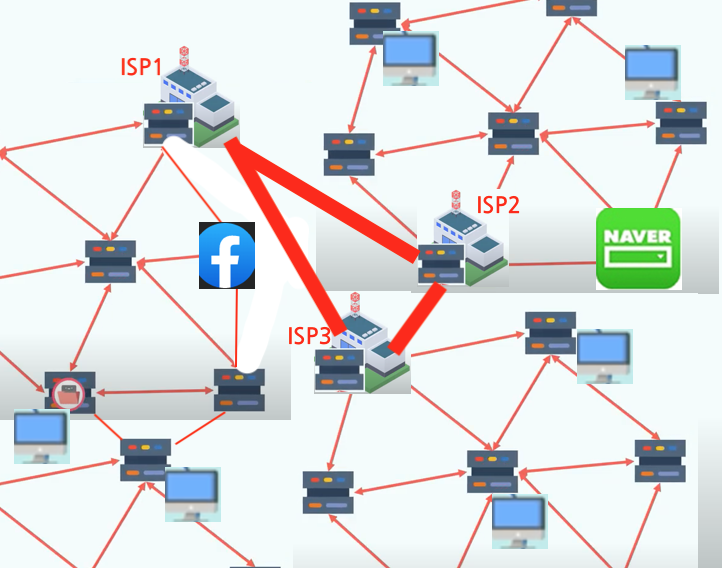
What happened? Telcos hosting popular contents like Facebook or NAVER in the picture above by definition became the net sender of the traffic and had to pay other telcos. So competition among ISPs to host popular contents disappeared and Korea became the only country that the transit prices, the internet access fees that content providers pay, did not fall. As a result, in 2016, the content provider side internet access fee or in short transit became 4-5 times NY/LA or 8-10 times Paris/London.
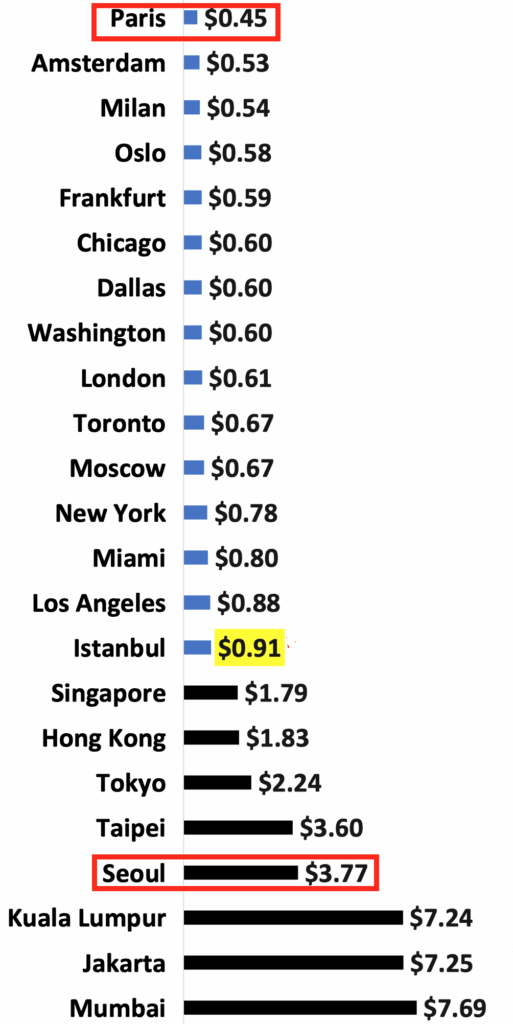
0of%20Broadband%20in%20Asia-Pacific%2C%20LIRNEasia.pdf (accessed 13 April 2025)


Source: J. Miller, ‘2021 Global Pricing Trends in 20 Minutes’, Telegeography, 2021, https://blog.telegeography.com/2021
-global-pricing-trends-in-20-minutes (accessed 13 April 2025).
This has made the network environment toxic for Korean content providers which explains why we don’t see many successful startups from the country since NAVER and Kakao. Even public interest apps like COVID19 contact tracing apps, the operators complained to the media that network fees are restricting the ability to meet the demand. Many Korean content providers also ended up leaving Korea to avoid the exorbitant internet access fees.
Also, it has exerted an upward pressure on the paid peering fees that Korean ISPs charge on some overseas content providers. Twitch pulled out of Korea citing ‘network fees 10 times more expensive than in most other countries’. You see if this happens, NAVER and other domestic content providers will love network usage fee bill since it eliminates competitors but they are dead set against it. Why not? Because network use fee law will consolidate the high transit fees that NAVER and KAKAO are paying the telcos. On top of that, Cloudflare gave up serving Korea content from Korea but instead serving from Hong Kong or Tokyo, making Korea the market with highest latency among OECD.
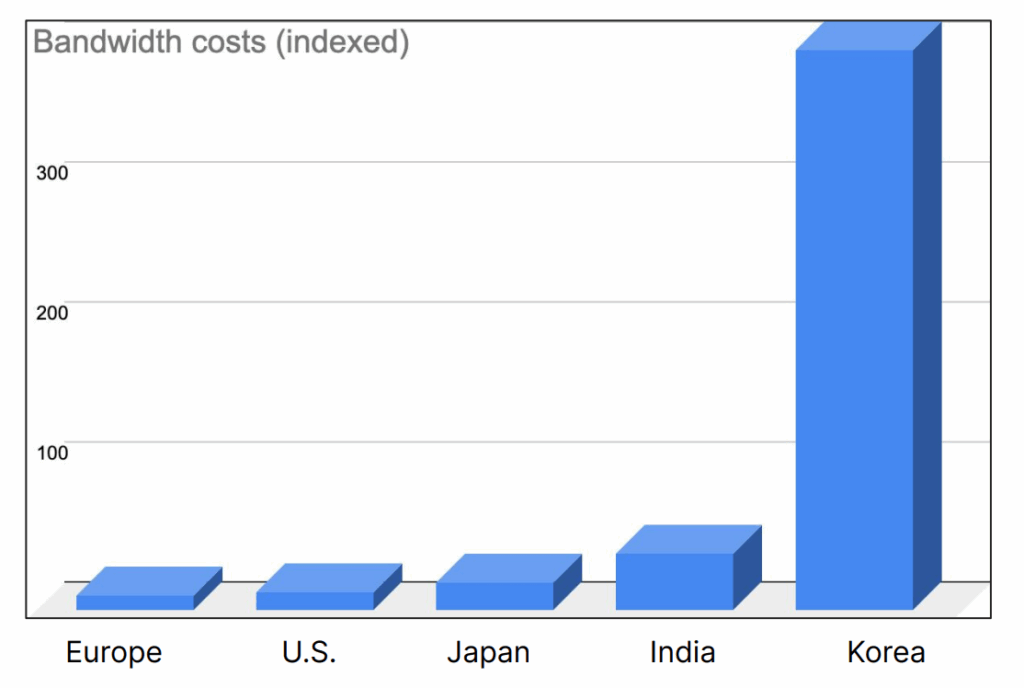
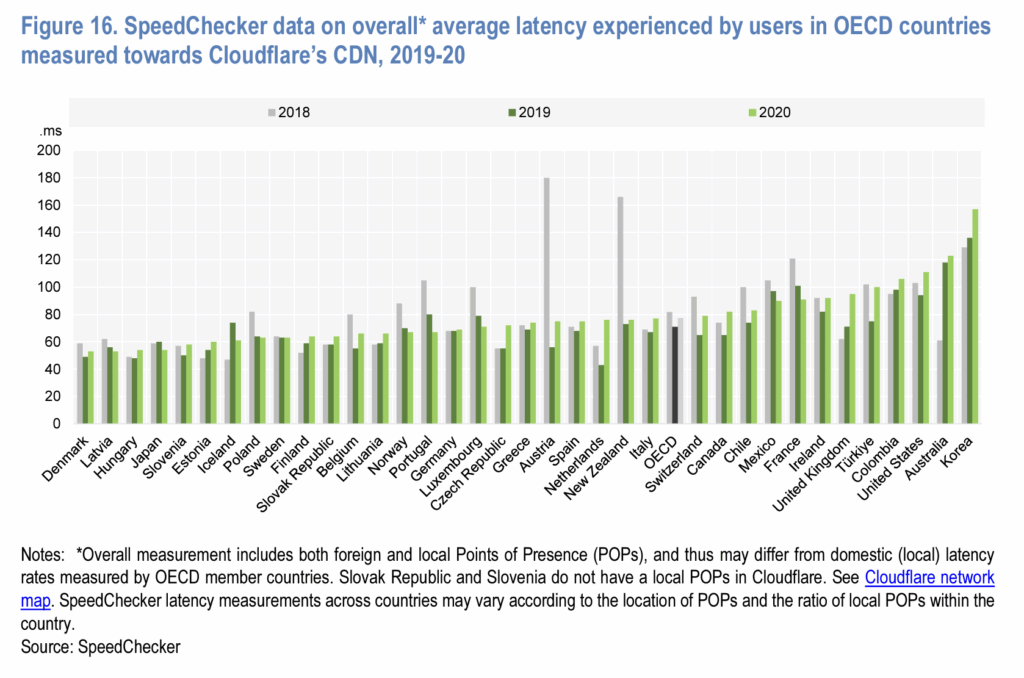
Probably, there is a nagging argument that still big techs should do something when their share is more than 40% of the entire traffic volume. The argument is very childish. NVIDIA chips cover 90% of AI chips market. Does it mean that they have to pay something back . But does sending data more mean more cost? No? We have to actually look at the cost. If you look at the cost of maintaining the network even including capital expenditure, it did not increase over the four years of pandemic during which the traffic increased 5 times.
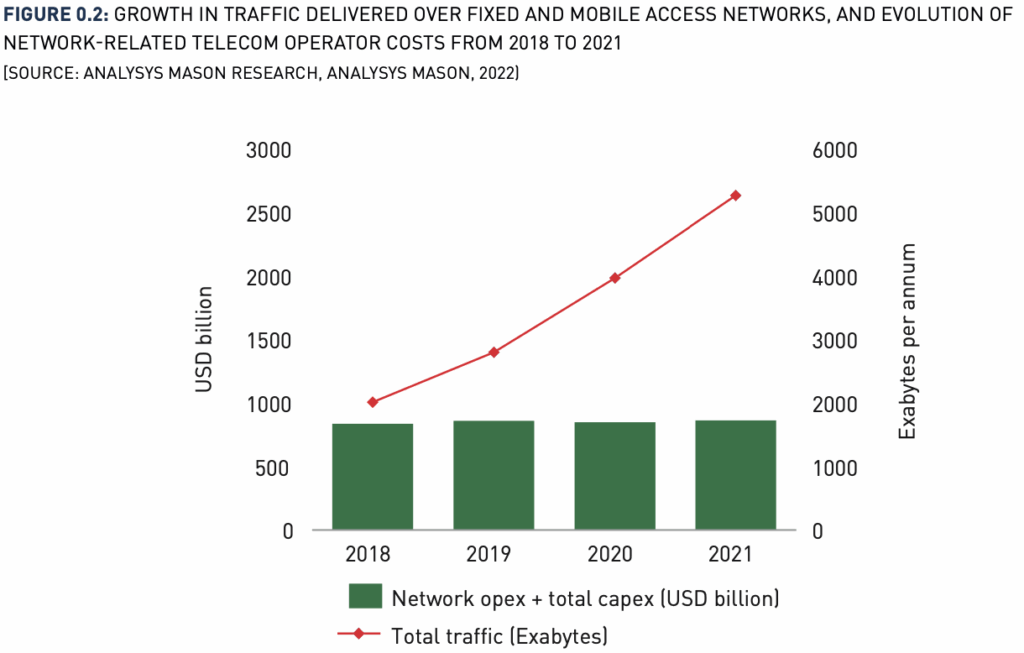
ON THE ECONOMICS OF BROADBAND ISPs”, October 2022, p.33
Why? Because no matter how much traffic is passed through the pipelines, it does not create any more cost.
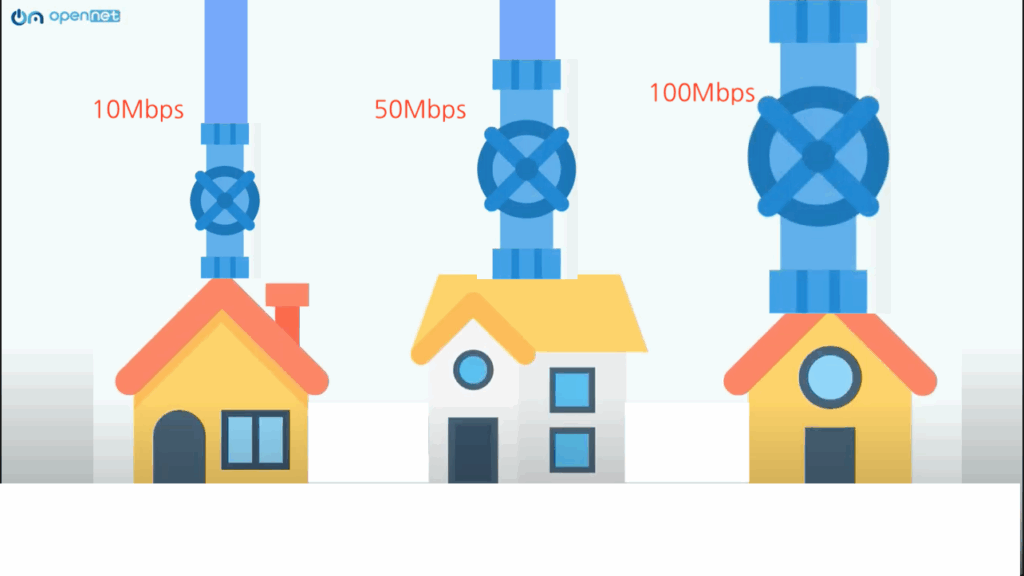
What causes a burden on the network is the telcos’ failure to provide sufficient local network capacity to support the advertised bandwidth sold to each household.
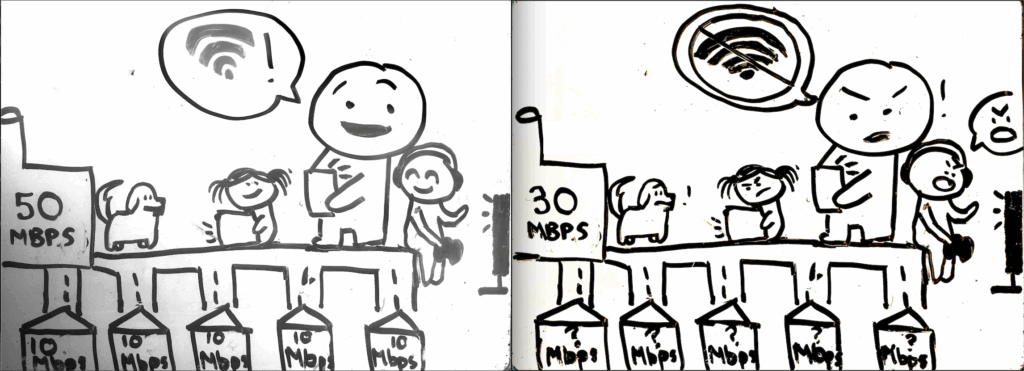
A new argument is that they just need transfer of wealth from big techs to telcos to build out the network. I would agree with that only it actually happens. All telcos are given monopolies by the national governments on frequencies and use of underground conduits and hanging space along the electric poles. In return, they have public interest obligations just like broadcasters, to connect as many people as possible. Why pay them? If at all, governments themselves can provide internet. Open Net and Association for Progressive Communications worked years ago to lift the ban on municipal internet in South Korea. We succeeded but we realized how much Korean telcos lobbied against it. They were saying they don’s have resources to build out the network but if local governments were willing to do it, they will be losing profit?


0 Comments